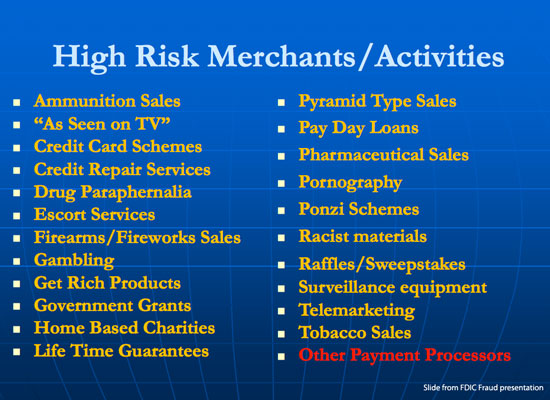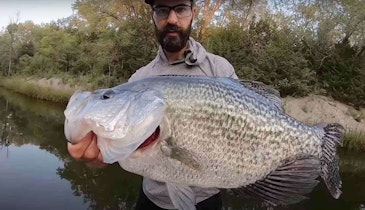A recent initiative launched by the top government regulator of financial institutions to restrict access to credit services by businesses like porn shops, payday lenders and so-called “pyramid schemes” has expanded to ensnare gun stores and ammunition sales, Grandviewoutdoors.com has learned.
According to documents and interviews, the Federal Deposit Insurance Corporation and the Department of Justice have been working through a program dubbed “Operation Choke Point” to squeeze businesses the Obama Administration deems at “high risk” of committing fraud on their customers.
“Operation Choke Point [is] attempting to shut off the financial oxygen of what are called Third Party Payment Processors,” the Competitive Enterprise Institute’s Iain Murray told NRA News. “What they do is remotely create checks to allow you to buy a product online or sometimes over the phone.”
In a document obtained by Grandviewoutdoors.com, the FDIC deems high-risk merchants and activities to include “get rich” products, pay day loans, home-based charities and credit repair services. The goal of Choke Point is to put banks that service these industries under additional scrutiny from federal regulators to make sure they’re not defrauding their customers.
But in a move that has alarmed many firearms retailers, the FDIC document also includes “ammunition sales” and “firearms/fireworks sales” as being potentially subject to Operation Choke Point’smandates.
Has Operation Choke Point affected you? Let us know in the comments section and tell us your story.
Concern with Operation Choke Point’s reach into lawful firearms and ammunition businesses has prompted the industry’s top trade association to weigh in and enlist lawmakers’ help to defund the initiative’s efforts against gun shops.
“We respect the right of financial institutions to make business decisions based on objective criteria,” the National Shooting Sports Foundation said in a May 28 statement. “It is unacceptable, however, to discriminate against businesses simply because they are engaged in the lawful commerce of firearms, an activity protected by the Second Amendment.”
While whispers of Operation Choke Point date back to 2011, the first direct mention occurred in September 2013.
At a meeting of the Federal Financial Institutions Examination Council entitled “Third Party Payment Processors: Relationships, Guidance, and Case Examples,” speakers representing the FDIC and Department of Justice demonstrated how some of the pieces fit together.
Grandviewoutdoors.com has uncovered training materials identifying firearms businesses as high risk as recently as April 29 during an FDIC New York Region Regulatory Teleconference.

While the underlying objectives of the initiative sound innocent enough, many worry the increased oversight could be used to squeeze legitimate businesses the federal government doesn’t like into default.
Looking carefully at the content of the September 2013 FFIEC meeting, one sees the primary message of education about types of fraud, how to identify it, and how to apply pressure to banking institutions to stop it by severing relationships with offending third party processing organizations.
"Cutting off the scammers’ access to the payment systems is relatively efficient and fast and protects consumers prospectively as we investigate,” said Justice Department attorney Joel Sweet, during the 2013 presentation. The presentation outlined the $40 billion annual consumer fraud problem arising from phone bill cramming, telephone scams and all sorts of unauthorized bank account withdrawals.
But under the guise of policing fraudulent services, the addition of firearms and ammo sales has gun rights advocates calling foul.
It is unclear why gun-related sales are part of the FDIC’s “high risk” pool, since they represent a simple transfer of tangible assets for money rather than a promise of services that sound too good to be true.
And that’s why advocates are worried the initiative is a back-door attack on the Second Amendment.
In a January letter to Attorney General Eric Holder, California Republican Rep. Darrell Issa and Ohio Republican Rep. Jim Jordan express concern about inclusion of legal businesses in Operation Choke Point.
“Unfortunately, it appears the Department [of Justice] is using its authority to create an indiscriminate dragnet what is wholly decoupled from any concrete suspicion of fraud,” the letter says.
Simply by signaling intent to increase the level of scrutiny of certain bank customers, defined as “high risk” business types, federal authorities can exert enormous pressure on banks, experts say. What institution would want more frequent audit activity simply by choosing to maintain business relationships with customers deemed undesirable by auditors?
Choke Point intimidates “banks into stopping their relationships with these third party payment processors,” the Competitive Enterprise Institute’s Murray explains.
“So basically the regulators are wandering into the banks saying, 'you’re dealing with these terrible industries that we disapprove of. We’re going to audit you, and you’re going to have much more regulatory supervision unless you terminate your relationship with them,' ” he adds. “As a result, [the banks] are terminating the relationships.”
The most frightening part of Operation Choke Point is that direct action is not required to have a negative impact on the firearms and ammunition industry.
The act of classifying these businesses in the same category as credit card schemes purveyors and Ponzi scheme perpetrators sends a clear message to financial institutions: If your client base includes businesses in this category, you’ll be placed under a higher degree of scrutiny and subject to additional audit.
“The extraordinary breadth of the Department’s dragnet prompts concern that the true goal of Operation Choke Point is not to cut off actual fraudsters’ access to the financial system, but rather to eliminate legal financial services to which the Department objects,” the Issa-Jordan letter says. “If Department attorneys are making these demands, the Department is needlessly pushing good actors with the bad, and threatening legitimate merchants’ access to the payment transfer system.”
As any bank will want to avoid costly and intrusive oversight, they will naturally shy away from customer types that inflict pain through regulation.
As the Operation Choke Point Strategy simply encourages banks to change behavior, assigning actions against firearms businesses directly to the strategy is difficult.
“We have run into a couple banks over the last few years that have declined credit facilities due to the nature of our business,” says SilencerCo founder Joshua Waldron. “However, the evidence is not clear as to exactly why — whether it was from government influence or just company policy.”
Retail firearms stores across the country are being affected too.
"TD Bank refused to increase my line of credit to match my collateral. Mind you, I was over collateralized in their favor,” East Coast Gun Shop’s Sprovero says. “The reason provided for the denial was that 'I was not the type of industry they cared to expand into.’ "
Apparently the definition of “firearms businesses” is far reaching. Bank of America went so far as to freeze the accounts of a well-known author of ammunition guides – without notice.
Missouri Rep. Blaine Luetkemeyer summed up the danger in a recent communication to constituents.
“Consider that for a moment: we aren’t talking about businesses that are breaking laws,” Luetkemeyer said. “We are talking about businesses operating legally, yet our government believes it has the moral authority to try and shutter an entire portion of the private sector which is playing by the rules based on a moral assessment made by federal bureaucrats and political appointees.”
So far the Department of Justice has provided no substantive response to multiple congressional requests for information related to Operation Choke Point, officials say.






